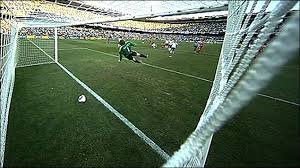By Andrew Warshaw
August 9 – English football leaders have hailed the forthcoming introduction of goalline technology in the Premier League as one of the most crucial breakthroughs in the history of the laws of the game.
Following FIFA’s implementation of technology at the Club World Cup in January and again at the Confederations Cup this summer – FIFA aren’t using Hawk-Eye which is considerably more expensive than the German GoalControl system they have successfully used – the Premier League will be the first to embrace it at club level.
The system uses 14 cameras to determine if the ball has crossed the line and will inform the referee within one second via his watch and ear-piece.
The first official test involving what will be termed Goal Decision System will be this Sunday’s annual pre-season Community Shield match at Wembley, between Manchester United and Wigan, before it is applied across all 20 Premier League grounds for the start of the season the following weekend.
“It’s a very exciting development in world football. It’s a goal decision system – it is longer just goal-line technology,” said Premier League chief executive Richard Scudamore.
Speaking at the system’s launch at Arsenal’s Emirates Stadium, Scudamore revealed there were 31 occasions last season where the system would have been helpful – three of which ended up with incorrect decisions.
“It’s taken a lot of time and effort and money since 2006 but we’ve got here at last and it’s very exciting,” he said. “It makes a very quick decision, in less than a second. If there were any doubt we wouldn’t be using it at all.”
Replays of goal-line decisions, taken using a high-speed camera, will be passed to broadcasters and also shown on big screens in stadiums.
UEFA boss Michel Platini has long opposed goalline technology for fear it will be extended to decisions for things like controversial penalty and offside decisions, and will not use it in UEFA competitions. But English FA general secretary Alex Horne – who sits on the game’s law-making body, the International FA Board (IFAB) – played down such concerns.
“I think we need to be very careful about what other decisions we think it is appropriate for,” said Horne. “I don’t want to undermine the referees and you can reach a position in other sports where referees are reliant on technology and their roles are a little bit confused. Offside decisions can be quite subjective.”
“I am sure with the advancements in technology there will be something out there… but I will take some convincing that it’s right for the game and for referees.”
Nevertheless, Hawk-Eye is already conducting a two-year pilot project in the Dutch top flight to see whether technology could help a video referee. “Over the two years they will gather data as to what kind of decisions can be made in what kind of time,” said Paul Hawkins, Hawk-Eye’s inventor. “The key element is clearly how quickly a decision can be made so this is pilot to answer that question.”
Contact the writer of this story as moc.l1745334159labto1745334159ofdlr1745334159owedi1745334159sni@w1745334159ahsra1745334159w.wer1745334159dna1745334159

